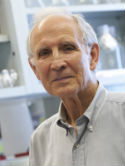| Abstract: |
The pleiotropic effects of the Kit receptor system are mediated by Kit-Ligand (KL) induced receptor autophosphorylation and its association with and activation of distinct second messengers, including phosphatidylinositol 3'-kinase (PI3-kinase), p21(ras) and mitogen-activated protein kinase (MAPK). To define the role of PI3-kinase, p21(ras) and MAPK in Kit-mediated cell proliferation, survival and adhesion in bone marrow-derived mast cells (BMMC), mutant Kit receptors were expressed in W(sh)/W(sh) BMMC lacking endogenous c-kit expression. The introduction of both murine Kit(S) and Kit(L) (isoform containing a four amino acid insert) into W(sh)/W(sh) BMMC restored KL-induced proliferation, survival and adhesion to fibronectin, as well as activation of PI3-kinase, p21(ras) and MAPK, and induced expression of c-fos, junB, c-myc and c-myb mRNA. Substitution of tyrosine 719 in the kinase insert with phenylalanine (Y719F) abolished PI3-kinase activation, diminished c-fos and junB induction, and impaired KL-induced adhesion of BMMC to fibronectin. In addition, the Y719F mutation had partial effects on p21(ras) activation, cell proliferation and survival, while MAP kinase activation was not affected. On the other hand, Y821F substitution impaired proliferation and survival without affecting PI3-kinase, p21(ras) and MAPK activation, and induction of c-myc, c-myb, c-fos and c-jun mRNA, while KL-induced cell adhesion to fibronectin remained intact. In agreement with a role for PI3-kinase in Kit-mediated cell adhesion, wortmannin blocked Kit-mediated cell adhesion at concentrations known to specifically inhibit PI3-kinase. We conclude, that association of Kit with p85(PI3-K), and thus with PI3-kinase activity, is necessary for a full mitogenic as well as adhesive response in mast cells. In contrast, tyrosine 821 is essential for Kit-mediated mitogenesis and survival, but not cell adhesion. |
| Keywords: |
signal transduction; mitogen activated protein kinase; controlled study; proto-oncogene proteins; nonhuman; comparative study; mutant protein; cell proliferation; animal cell; mouse; animal; mice; bone marrow cells; cell survival; cell division; stem cell factor; proto oncogene; amino acid substitution; enzyme activation; structure activity relation; tyrosine; mice, inbred c57bl; gene expression regulation; amino acid sequence; messenger rna; phosphotransferases (alcohol group acceptor); 1-phosphatidylinositol 3-kinase; cell adhesion molecules; gene induction; receptor protein-tyrosine kinases; ras proteins; proliferation; oncogene c myc; protein p21; cell adhesion; oncogene c myb; phenylalanine; wortmannin; fibronectin; adhesion; mast cell; mast cells; growth factor receptor; fibronectins; ca(2+)-calmodulin dependent protein kinase; phosphatidylinositol kinase; priority journal; article; kit receptor; support, non-u.s. gov't; support, u.s. gov't, p.h.s.; oncogene c fos; hematopoietic cell growth factors; oncogene c jun; kit tyrosine 821; proto-oncogene protein c-kit; receptors, colony-stimulating factor
|





